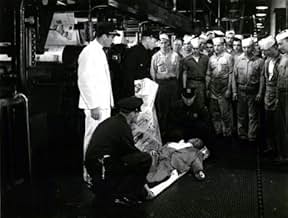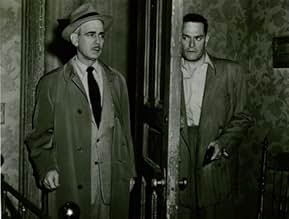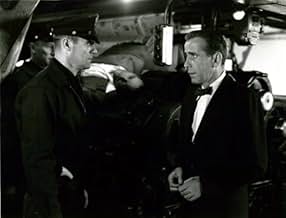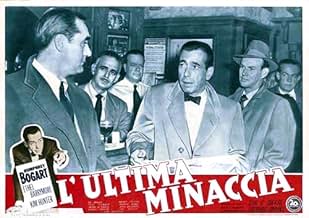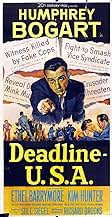IMDb RATING
7.2/10
4.7K
YOUR RATING
With his newspaper about to be sold, crusading editor Ed Hutcheson tries to complete an exposé on gangster Rienzi.With his newspaper about to be sold, crusading editor Ed Hutcheson tries to complete an exposé on gangster Rienzi.With his newspaper about to be sold, crusading editor Ed Hutcheson tries to complete an exposé on gangster Rienzi.
- Awards
- 2 wins total
Joe De Santis
- Herman Schmidt
- (as Joseph De Santis)
Parley Baer
- Headwaiter
- (uncredited)
Bill Baldwin
- Man Asking for Ed Hutcheson
- (uncredited)
Willis Bouchey
- Henry
- (uncredited)
Lovyss Bradley
- Woman
- (uncredited)
John Brooks
- Reporter
- (uncredited)
Ralph Brooks
- Newspaperman
- (uncredited)
- Director
- Writer
- All cast & crew
- Production, box office & more at IMDbPro
Featured reviews
Being the editor of a newspaper is intense, when the world outside your window don't make sense, where gangsters rule the roost, the owners easily seduced, an ex-wife who will not give you recompense. So we follow you around and watch you play, it's fair to say, that these are not ordinary days, always going toe to toe, they could be friends, they could be foes, but you ensure everyone, hears what you say. The performances are fine and competent, the emotion and the passion sufficient, not really sure the story's deep, there's not a lot of underneath, but it's 90 minutes that can be well spent.
The film opens with a businessman being questioned in a courtoom, similar to the House Un-American Committee This newspaper may be sold, right in the middle of the biggest news story of the year. Stars Bogart as the editor, and Ethel Barrymore as Mrs. Garrison, the owner. and Jim Backus (Mr. Howell, from Gilligan's Island) is in here. Bogart tries to convince Mrs. Garrison to keep the paper going, but its an uphill battle. Not a lot of votes on imdb for this one, so TCM must not show it very often. Touching scene, where the reporters all hold a memorial for the paper in the bar.... even more prescient today, when there are very few papers left, and those few are an endangered species. Some similarites to Citizen Kane, where the respectable paper can't compete with the yellow, sensational papers for circulation. Written and directed by Richard Brooks, who was married to Jean Simmons. Pretty good stuff. I had never seen this one before. It really strikes a nerve today, with the interwebs really killing off newspapers.
I don't know if it was intended to copy the fast-paced press room and gangster films that Warner Brothers did in the 1930's, but you certainly get a chance to see what Bogart could have done had he been a star at Warner Brothers during the 30's rather than largely a supporting player. Of course, everything here is taking place in present day - 1952 - but not only does the film reach backwards for its brisk pace, it reaches forward into the 21st century with some of its subject matter. In particular, there is the subject of how big companies buy smaller more effective companies to eliminate the competition, and the subject of inherited wealth and how the companies that formed that wealth are often not appreciated by the spoiled children-heirs.
Here Bogart plays the editor in chief of crusading hard-hitting daily newspaper "The Day", which is about to be sold off by the bored children of the deceased founder. The founder's widow (Ethel Barrymore) unfortunately is outvoted by her ungrateful children, and with the encouragement of Bogart's character tries to come up with enough money to buy her children's shares back from her daughters. In parallel with this is the story of The Day trying to break one last big story before they are bought out - a story that will break the power of a local crime boss who is not taking his possible downfall lying down.
This one is seldom seen and very well done, and I highly recommend that you see it if it ever comes your way.
Here Bogart plays the editor in chief of crusading hard-hitting daily newspaper "The Day", which is about to be sold off by the bored children of the deceased founder. The founder's widow (Ethel Barrymore) unfortunately is outvoted by her ungrateful children, and with the encouragement of Bogart's character tries to come up with enough money to buy her children's shares back from her daughters. In parallel with this is the story of The Day trying to break one last big story before they are bought out - a story that will break the power of a local crime boss who is not taking his possible downfall lying down.
This one is seldom seen and very well done, and I highly recommend that you see it if it ever comes your way.
This wonderful 1952 film - it must have been approaching Humphrey's last performance - wins on all levels.
It triumphs as an historical curiosity into how newspapers were published 50 years ago, down to the presses and the layouts and assignments, and also for its truly remarkable supporting cast, many of them, some famous, like Ethel Barrymore, Jim Backus and Ed Begley and some part of the Hollywood backdrops in score of movies.
Kim Hunter excels also as the Bogart ex. Martin Gabel eerily predicts the Tony Soprano performance of today as an underworld Kingpin shown with his perfect domestic arrangement.
The scene of the "wake" for the death of the newspaper is wonderful, and also some wonderful camera pans on continuous action in many scenes.
The script is well done and keeps the action moving along, some funny throwaway lines too, particularly in the car scene with the mobster and in his ex-wife's bedroom.
Also it is subtle and understated and not rampant with the 2X4's of some of today's instant-soup scripts. Do not miss this one, Bogie and Kim fans!!
8 out of 10.
It triumphs as an historical curiosity into how newspapers were published 50 years ago, down to the presses and the layouts and assignments, and also for its truly remarkable supporting cast, many of them, some famous, like Ethel Barrymore, Jim Backus and Ed Begley and some part of the Hollywood backdrops in score of movies.
Kim Hunter excels also as the Bogart ex. Martin Gabel eerily predicts the Tony Soprano performance of today as an underworld Kingpin shown with his perfect domestic arrangement.
The scene of the "wake" for the death of the newspaper is wonderful, and also some wonderful camera pans on continuous action in many scenes.
The script is well done and keeps the action moving along, some funny throwaway lines too, particularly in the car scene with the mobster and in his ex-wife's bedroom.
Also it is subtle and understated and not rampant with the 2X4's of some of today's instant-soup scripts. Do not miss this one, Bogie and Kim fans!!
8 out of 10.
The 40's and 50's had quite a few movies in which newspapers and newspapermen were the central focus. There was "Scandal Sheet," "Ace in the Hole," "It Happened Tomorrow," "Foreign Correspondent," "His Girl Friday," this movie, and others. I suppose it makes sense considering print media was the largest and most influential form of media with television a decade or so away from becoming the ubiquitous medium it is now.
Ed Hutcheson (Humphrey Bogart) was the editor of The Day, a thriving New York newspaper. The owner and founder had just died and The Day was being sold by the wife and the two daughters. Ed was giving it his all trying to do what he could to prevent the sale as well as continue to print relevant news. He dedicated all of his staff and resources to looking into a local mobster named Tomas Rienzi (Martin Gabel) when one of his reporters was hospitalized for digging up too much information on the same gangster. He thought maybe, just maybe, this story would both: expose a criminal and save the paper.
This was an ideologue movie. There were two stories running parallel to each other. One was the story of the gangster and his outsized influence, the other was the newspaper being sold to a competitor who was going to shutter it. The gangster story was a thrilling one, but the paper being sold was a principled one.
If The Day was sold to a competitor and then closed down, that would be one less voice for the people. It would be one less viewpoint, one less source of news, and one less competitor for the other papers. Such a thing couldn't be good for the reader and the average citizen. Market competition has always benefited the consumer (even though it's not benefiting us much nowadays with gas prices) while monopolies have always harmed the consumer.
This was a pivotal issue with The Day being sold, but it also directly confronted a person's or business's capitalistic right to sell their property. Should the courts prevent this sale based upon it taking away a source of news from your average citizen, what other sales would the courts be allowed to, or have to prevent? It was a novel argument that played out on screen and gave the viewer food for thought.
Free on YouTube.
Ed Hutcheson (Humphrey Bogart) was the editor of The Day, a thriving New York newspaper. The owner and founder had just died and The Day was being sold by the wife and the two daughters. Ed was giving it his all trying to do what he could to prevent the sale as well as continue to print relevant news. He dedicated all of his staff and resources to looking into a local mobster named Tomas Rienzi (Martin Gabel) when one of his reporters was hospitalized for digging up too much information on the same gangster. He thought maybe, just maybe, this story would both: expose a criminal and save the paper.
This was an ideologue movie. There were two stories running parallel to each other. One was the story of the gangster and his outsized influence, the other was the newspaper being sold to a competitor who was going to shutter it. The gangster story was a thrilling one, but the paper being sold was a principled one.
If The Day was sold to a competitor and then closed down, that would be one less voice for the people. It would be one less viewpoint, one less source of news, and one less competitor for the other papers. Such a thing couldn't be good for the reader and the average citizen. Market competition has always benefited the consumer (even though it's not benefiting us much nowadays with gas prices) while monopolies have always harmed the consumer.
This was a pivotal issue with The Day being sold, but it also directly confronted a person's or business's capitalistic right to sell their property. Should the courts prevent this sale based upon it taking away a source of news from your average citizen, what other sales would the courts be allowed to, or have to prevent? It was a novel argument that played out on screen and gave the viewer food for thought.
Free on YouTube.
Did you know
- TriviaOriginally titled 'The Newspaper Story', location shooting took place both in the newsroom and the printing plant of The New York Daily News, with real pressmen playing themselves. This was augmented by an 'almost letter-perfect' reproduction of a newsroom on a Hollywood soundstage.
- GoofsAs Rienzi's car drives off after picking up Hutcheson, a large studio light is reflected against the side window of the car.
- Quotes
[last lines]
Ed Hutcheson: That's the press, baby. The press! And there's nothing you can do about it. Nothing!
- ConnectionsFeatured in Las Vegas, un couple (1970)
- SoundtracksJohn Brown's Body
(uncredited)
Traditional tune, lyrics attributed to various writers
Sung, with modified lyrics, by the staff in the bar and heard as a theme at other times.
- How long is Deadline - U.S.A.?Powered by Alexa
Details
Box office
- Gross worldwide
- $5,228
- Runtime
- 1h 27m(87 min)
- Color
- Aspect ratio
- 1.37 : 1
Contribute to this page
Suggest an edit or add missing content


